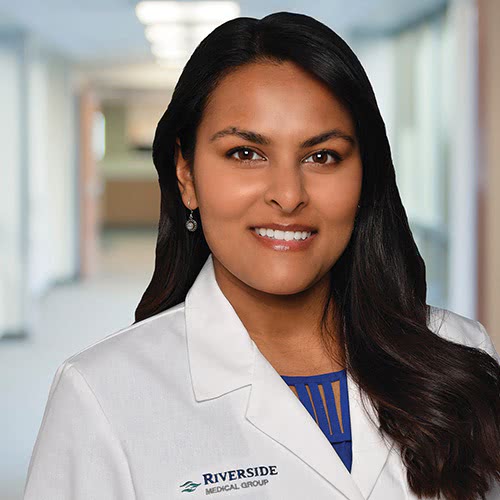
According to the CDC, colon cancer is the third leading cause of cancer-related deaths in the United States. It affects males and females and is the third most common cancer found in both.
“Patients who are diagnosed at an early or localized stage tend to have a much higher survival rate than those who are diagnosed once the disease has metastasized,” states Dr. Bushra Alam. Dr. Alam, an internal medicine provider at Riverside Healthcare Frankfort campus, educates about screenings, early treatment, and understanding of one’s risk.
What is Colorectal Cancer?
Colorectal cancer is a disease in which malignant cells develop in the tissues or the lining of the colon or rectum. Oftentimes, these cells originate from benign growths called polyps. They can develop slowly, and based on the development process, Dr. Alam generally recommends that colon cancer screening starts in an average-risk person around the age of 50. For those with a history of inflammatory bowel disease or other risk factors, screening may be suggested starting at age 45.
Since colon cancer is often asymptomatic, it is best to follow screening recommendations. “You might not know there’s something going on,” cautions Dr. Alam. “Or, it can present with symptoms such as changes in bowel habits, blood in the stool, chronic diarrhea, constipation, or unexplained weight loss.”
The Screening Process
Those with average risk between ages 50 and 75 may have a choice between a colonoscopy and an at-home stool study test known as Cologuard. Individuals mail a stool sample to the lab for genetic testing, in order to check for DNA mutations that predispose a patient to colon cancer. It also checks for blood in the stool that could be caused by polyps or lesions. If the at-home stool test is negative, a new test may be recommended in three years.
Colonoscopy is another method of screening, and it may be recommended based on Cologuard results. Dr. Alam breaks down the process: “Colonoscopy is basically a scope that allows for direct visualization of the colon to look for any polyps, masses, lesions, or anything like that. The benefit of the test is that it’s both diagnostic and therapeutic. Because it’s a direct visualization, if there are polyps, they can actually be removed right then and there and then sent for tissue sampling.”
Both screening options are typically covered by most private insurance companies and Medicare. There may be financial assistance or other programs available for those with limited access to screening. While Cologuard can be done at home, colonoscopy involves scheduling and about two days for preparation and the procedure.
Diagnosis of colon cancer leads to staging and a treatment plan. Treatment can vary from surgical removal of the mass to chemo or radiation. Financial assistance and clinical trials may be available.
Racial Disparity and Colorectal Cancer
Based on research, it’s known that colorectal cancer disproportionately affects individuals from low socioeconomic backgrounds. Studies have shown that these individuals have up to a 31% higher risk of developing colorectal cancer. “We also find that African Americans, both men, and women, have the highest incidence and mortality rate with colorectal cancer,” notes Dr. Alam.
This could be the result of a lack of education or access to education about colon cancer screenings. However, new studies have shown genetic variability. “The location of some of these polys or cancerous cells can be a little bit different in African Americans, which can actually make it more difficult to detect them,” adds Dr. Alam.
Additionally, inflammatory diets, poor gut health, and autoimmune diseases can increase the likelihood of developing certain kinds of cancers. Some studies have found more inflammatory bacteria from colonoscopy samples of African Americans versus non-Hispanic white individuals.
“This increased risk has some medical societies recommending screenings at age 45 for African Americans so that we are much less likely to miss anything,” concludes Dr. Alam.
Contact your provider to discuss screening options that are right for you. Need help finding a provider? Visit riversidehealthcare.org or call (855) 404-DOCS (3627).